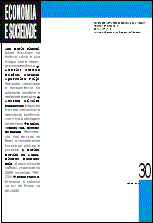Resumo
A defesa de um desenho institucional para as economias domésticas que permita a livre circulação de capitais entre as fronteiras é fundamentada por modelos teóricos que sublinham um conjunto de canais por meio dos quais a Integração Financeira Internacional levaria à melhoria na eficiência da alocação de recursos, estimulando o crescimento econômico de longo prazo dos países. O objetivo do trabalho é realizar uma crítica a essa abordagem, mostrando as fragilidades das teorias que estabelecem essa relação, a ausência de evidências empíricas a corroborá-la e, tendo por base fundamentos de inspiração (pós) Keynesiana acerca do comportamento do mercado financeiro, esboçar uma abordagem alternativa.
Abstract
The arguments in favor of developing an institutional framework for the liberalization of capital flows among countries are based on theoretical models that underline a set of channels through which the International Financial Integration would lead to a better resource allocation, stimulating long run economic growth. The aim of this work is to make a critical evaluation of those models, emphasizing their main fragilities and the lack of empirical evidence to support them. In addition, this paper outline an alternative approach, a Post-Keynesian point of view.
Key words: International financial integration. Macroeconomic instability. Economic growth
Referências
AGÉNOR, Pierre-Richard. Benefits and costs of international financial integration: theory and facts. Washington, DC: The World Bank, 2003.
ALVES JR., A. J.; FERRARI FILHO, F.; PAULA, L. F. The post Keynesian critique of conventional currency crisis models and Davidson’s proposal to reform the international monetary System. Journal of Post Keynesian Economics, v. 22, n. 2, p. 209-227, Winter, 1999-2000.
BAILLIU, J. N. Private capital flows, financial development, and economic growth in developing countries. Ottawa: Bank of Canada, 2000. (Working Paper).
BOORMAN, J.; ALLEN, M. A new framework for private sector involvement in crisis prevention and crisis management. In: REFORMING the International Financial System: Crisis Prevention and Response, FONDAD, Dec. 2000.
CARKOVIC, M.; LEVINE, R. Does foreign direct investment accelerate economic growth? University of Minnesota, 2002.
CARVALHO, Fernando J. Cardim de. Controles de capitais: uma agenda de pesquisa. Rio de Janeiro: IE-UFRJ, Grupo Moeda, 2004. (Texto para Discussão).
CARVALHO, Fernando J. et al. Controvérsias recentes sobre controles de capitais. Rio de Janeiro: IEUFRJ, Grupo Moeda, 2003. (não publicado).
CARVALHO, Fernando J; SICSÚ, J. Teorias e experiências de controles do fluxo de capitais: focando o caso da Malásia. Rio de Janeiro: IE-UFRJ, 2004. (Texto para Discussão).
COOPER, R. N. Should capital-account convertibility be a world objective? In: PETER, B. Kenen (Ed.). Should the IMF pursue capital-account convertibility. Princeton University, Department of Economics, 1998. (Essays in International Finance, n. 207).
DAVIDSON, P. Volatile financial markets and the speculator. Paper presented as The Economic Issues Lecture to the Royal Economic Society Annual Conference, Warwick, England, Apr. 1998a.
DAVIDSON, P. The case for regulating international capital flows. Paper presented at the Social Market Foundation Seminar on Regulation of Capital Movements, London, Nov. 17, 1998b.
DAVIDSON, P. Financial markets, money and the real world. Massachusetts: Edward Elgar, 2002.
DAVIDSON, P. The future of the International Financial System. Paper presented at Conference on the Future of Economics at Cambridge University, Sept. 18, 2003.
DEVLIN, Robert; et al. Crescimento dos fluxos de capital e desenvolvimento: uma visão geral das questões de política econômica. Pesquisa e Planejamento Econômico, Rio de Janeiro, v. 24, n. 3, p. 411-444, 1994.
EATWELL, John. International financial liberalization: the impact on world development. New York: CEPA, 1996. (Working Paper, n. 1).
EDISON, H. J.; KLEIN, M. W.; RICCI, L.; SLOEK, T. Capital account liberalization and economic performance: survey and synthesis. Massachusetts: National Bureau of Economic Research, 2002. (Working Paper, n. 9100).
EDISON, H. J; LEVINE, R.; RICCI, L.; SLOK, T. International financial integration and economic growth. Massachusetts: National Bureau of Economic Research, 2002. (Working Paper, n. 9164).
EICHENGREEN, B. et al. Capital account liberalization: theoretical and practical aspects. Washington, DC: International Monetary Fund, 1998. (Occasional Paper, n. 172).
FISHER, Stanley. Capital account liberalization and the role of the IMF. In: PETER, B. Kenen (Ed.). Should the IMF pursue capital-account convertibility. Princeton University, Department of Economics, 1998. (Essays in International Finance, n. 207).
KLEIN, M.; OLIVEI, G. Capital account liberalization, financial depth, and economic growth. Massachusetts, National Bureau of Economic Research, 1999. (Working Paper, n. 7384).
McLEAN, B.; SHRESTHA, S. International financial liberalization and economic growth. Sydney: Reserve Bank of Australia, 2002. (Research Discussion Paper, n. 3).
MISHKIN, F. Understanding Financial Crises: A Developing Country Perspective. Massachusetts, National Bureau of Economic Research, 1996. (Working Paper, n. 5600).
OBSTFELD, M. Risk-taking, global diversification and growth. American Economic Review, v. 84, n. 5, p. 1310-1329, 1994.
PRASAD, E.; ROGOFF, K. et al. Effects of financial globalization on developing countries: some empirical evidence. International Monetary Found, 2003.
QUINN, D. The correlates of change in international financial regulation. American Political Science Review, v. 91, n. 3, p. 531-551, 1997.
REISEN, H. et al. Which types of capital inflows foster developing-country growth. International Finance, v. 4, n. 1, p. 1-14, 2001.
RODRIK, D. Who needs capital-account convertibility? In: PETER, B. K. (Ed.). Should the IMF pursue capital-account convertibility. Princeton University, Department of Economics, 1998. (Essays in International Finance, n. 207).
ROGOFF, K. Managing the world economy. The Economist, Aug. 3, 2002.
SOTO, M. Capital flows and growth in developing countries: recent empirical evidence. Paris: OECD Development Centre, 2000. (Technical Papers, n. 160).
STIGLITZ, J. Capital market liberalization, economic growth, and instability. World Development, Washington, DC, World Bank, v. 28, n. 6, p. 1075-1086, 2000.
STIGLITZ, J. Globalization and growth in emerging markets and the new economy. Journal of Policy Modeling, v. 25, p. 505-524, 2003.
A Economia e Sociedade utiliza a licença do Creative Commons (CC), preservando assim, a integridade dos artigos em ambiente de acesso aberto.

